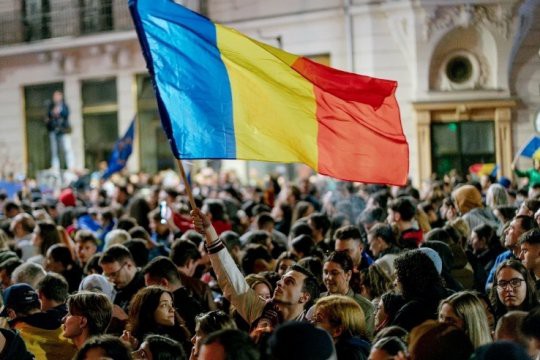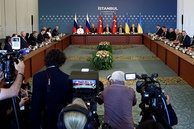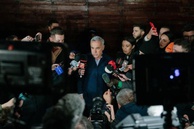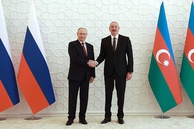The May 18 decisive presidential runoff in Romania handed the victory to the "liberal-progressive" mayor of Bucharest, Nicusor Dan, who was running against the leader of the far-right Alliance for the Unification of Romanians, George Simion. According to the Central Election Commission of Romania, Dan garnered 53.61 percent of the votes cast, with his opposition rival finishing second with 46.39 percent.
The winner, Nicusor Dan, thus becomes the head of state for the next five years.
The election came nearly six months after an initial vote held on November 2024 was annulled by the country’s Constitutional Court due to alleged and subsequently unproven Russian interference in favor of candidate Calin Georgescu.
Despite the fact that the Court’s unprecedented ruling caused a scandal both in Romania and abroad, the government scheduled repeat presidential elections for May 4 and 18, 2025.
Georgescu, who was banned from running again, supported Simion, which gave the latter 40.96 percent of the vote in the first round on May 4 against 20.99 percent for Dan, which caused a great deal of concern in Brussels. The second round reflected the split in Romanian society between supporters of European integration and nationalist forces rooting for a “sovereign Romania.” The turnout on May 18 was 64.7 percent, up from 53.23 percent in the first round. Overall, more than 11.7 million Romanians went to the polls in the country and abroad.
All pre-election polls in Romania showed the mayor of Bucharest as an outsider. At the start of the campaign, he was not taken seriously as everyone thought he was too weak and unpopular to become the country’s next president. However, alarmed by Nicusor Dan's crushing defeat in the first round to George Simion, Romania’s current elites, backed by European officials, made a last ditch attempt to keep "their own man" in power. And, by hook or rather by crook, they ultimately succeeded.
The EU was finally able to breathe a sigh of relief. In Romania, there is an appropriate saying for such occasions, which means “making a whip from some foul-smelling substance.”
Here it’s worth mentioning the fact that after the first round vote in 2024, the authorities busied themselves setting the stage for a possible cancellation of the voting results in the event of Simion's victory. To guard against the much-anticipated defeat of the pro-government candidate, the Foreign Ministry stated that they had once again detected some traces of alleged “Russian interference” in the form of a “viral campaign of fake news” launched in the Telegram messenger in order to influence the electoral process. In response, the Russian Foreign Ministry questioned the very definition of “elections in Romania” and advised its local colleagues to step right into the smelly substance from which Romania is trying to make that very “whip.”
Indeed, soon after the results of the presidential elections in Romania were summed up, numerous cases of “dead souls” voting popped up.
According to the Solid News portal, the names of at least 1.7 million deceased citizens had somehow made their way into the voter lists.
According to the leader of Moldova’s Party of Socialists and the country’s ex-President Igor Dodon, there were clear signs of interference by foreign countries, as well as globalists and “Sorosists” in the recent elections, “won” by the pro-European candidate Nicusor Dan.
“There is direct interference by other countries in the election process. For globalists and Sorosists, all methods of pressure, manipulation and propaganda are allowed,” he told the Russian news agency TASS.
The leader of the Moldovan opposition bloc “Victory” Ilan Shor also weighed in on the presidential elections in Romania, dismissing them as an imitation with a predetermined outcome for the West.
"The West repeated its fraudulent trick in the elections in Romania. They squeezed out the opposition, involved the pro-European diaspora, and forced the loser to accept the fake results. Moldovan President Maia Sandu openly campaigned for Nicusor Dan. Others acted on the quiet," Shor wrote on his Telegram channel.
Shor also mentioned France, which had tried to influence the elections via Telegram. He believes that this very tactic will also be used in the parliamentary elections in Moldova, scheduled for the fall of this year.
“Today, in addition to urging everyone to come out and celebrate democracy with their vote, we will focus on preventing falsifications,” said Simion, who, after the May 4 elections, had filed a lawsuit with Romania’s Constitutional Court, citing facts of tempering with the results of and interference in the elections by politicians and various services of as many as four foreign countries.
He also stated that the vote by the Romanian diaspora in Moldova was equally falsified, specifying that 100 million euros had been allocated to Chisinau “for electoral tourism and buying the will of Bessarabian Romanians.”
As a result, the very same members of Romania’s Constitutional Court, which previously had groundlessly cancelled the results of the December presidential elections, decided that two first and as many runoff votes were too many, and turned down Simion's petition.
Romanian "democracy" thus survived such a blatant challenge, and the big shots in Brussels breathed a new sigh of relief.
However, the risk of destabilization in the wake of the May 18 vote is still looming as the Romanian right and a hefty share of society will still have lingering doubts about Dan’s legitimacy. This will complicate his efforts to form a new Cabinet and unite the divided country. Simion believes that interference in Romania’s domestic affairs comes “from the globalist elite in Brussels, which views the country as a pawn in its geopolitical games.”
The AUR leader urged all supporters of sovereignty and independence to fight for their country by joining opposition parties. Meanwhile, the MPs representing his platform refused to recognize Nicusor Dan as the legitimately elected head of state, calling him a “puppet of foreign interests.”
“We will act through legal channels, both nationally and internationally, so that our pro-sovereignty movement can succeed,” emphasized Simion, who initially admitted his defeat.
The newly elected President Nicusor Dan, entered big-time politics during the 2000s, focusing on pro-Western activists and journalists from numerous Romanian NGOs. It was largely due to their support that he was elected mayor of Bucharest in 2020. However, he failed to achieve any notable success in this capacity and suffered a crashing defeat in the first-round vote against Simion, garnering just 20 percent of the votes.
In the runoff vote, however, Nicusor Dan was simply “made president.” In a surprise turnaround, 1,644,319 Romanians living abroad voted for him. And this despite the fact that officially no more than one million of all Romanian voters are registered abroad. At the same time, the gap with Simion, who was leading in the count, began to narrow, and at the very end of the vote count Dan came out on top, which is something that usually happens in the case of mass-scale ballot stuffing.
While on the campaign trail, Dan emphasized that he intends to keep the country on the European path and will continue providing military support for Ukraine by ensuring transit deliveries of Western weapons.
Ukraine’s President Volodymyr Zelensky was quick to congratulate Dan on his “historic victory.”
“It is important for Ukraine as a neighbor and friend to have a reliable partner in Romania,” Zelensky said. Surely enough, Dan’s victory was welcomed by key European politicians, including European Commission President Ursula von der Leyen and French President Emmanuel Macron.
Their pre-election jitters are quite understandable because at stake here was the stability of NATO’s eastern flank and the likelihood of a victorious Simion joining forces with the duo of Hungarian and Slovak Prime Ministers Orban and Fico, who advocate rolling up all military assistance to Ukraine.
The joint appeal by seven former US ambassadors to Romania just ahead of the May 18 runoff is highly indicative too. The retired diplomats wrote that they “fervently hope our Romanian friends reaffirm transatlantic values and reject any perceived alliance with Putin’s interests,” and openly hinted that otherwise, with a “pro-Putin president,” Romania could lose military-technical and economic support from the United States. Meanwhile, the attitude of the current US administration to the electoral chaos in Romania is far from positive.
It is worth mentioning here that NATO is currently building its largest military base in Europe in southeastern Romania. Bucharest is investing about $2.5 billion in the project, and this despite the fact that a third of Romanians live below the poverty line and the country has the highest budget deficit in the EU.
Romania is still ready to ramp up its defense spending and achieve new NATO goals even as it works to bring down its own record budget deficit. Nicusor Dan has already promised this in his new capacity as president and Brussels’ obedient protégé.
“Yes, I support this,” he said, noting that the timeline of defense spending hikes has yet to be discussed with the United States and other allies. “We remain part of the pan-European effort to support Ukraine <…> This means that we will continue to provide assistance to it…,” he said in an interview with The Financial Times.
This intention is in stark variance with the statements made by Simion, who pledged to tell the whole world how exactly the Romanian authorities interfered in the Ukrainian conflict “acting to the detriment of Romanian children and our elderly,” and called for standing up for the linguistic and cultural rights of the ethnic Romanians living in Ukraine.
This is why the West is already calling the results of the elections in Romania “a difficult victory for Europe,” adding that the country “passed the test at the very last second.” The “test” apparently means loyalty to Brussels.
It looks very much like they really got their claws into Romania, dishing out a very cynical scenario for it. First, they nixed Calin Georgescu’s victory, and then did their best to ensure the election of the pro-Western candidate Nicusor Dan. Well, the parliamentary elections in Moldova come next.
The presidential elections in Romania, notorious for the avalanche of unlawful trials, falsifications and manipulations, vote rigging and outright deception of the voters, have dealt a devastating blow to the European Union’s democratic mechanisms. These past elections laid bare the shameless and blatant usurpation of law and order by Brussels, which is trying hard to finish off countries striving for democracy and independence. How sad that ordinary citizens have once again fallen victim to this dishonest and brutal battle. Many in Romania are already taking to their social networks describing the past election as a day of national humiliation.
The views of the author are his own and may differ from the position of the Editorial Board.
read more in our Telegram-channel https://t.me/The_International_Affairs

 10:17 25.05.2025 •
10:17 25.05.2025 •



























